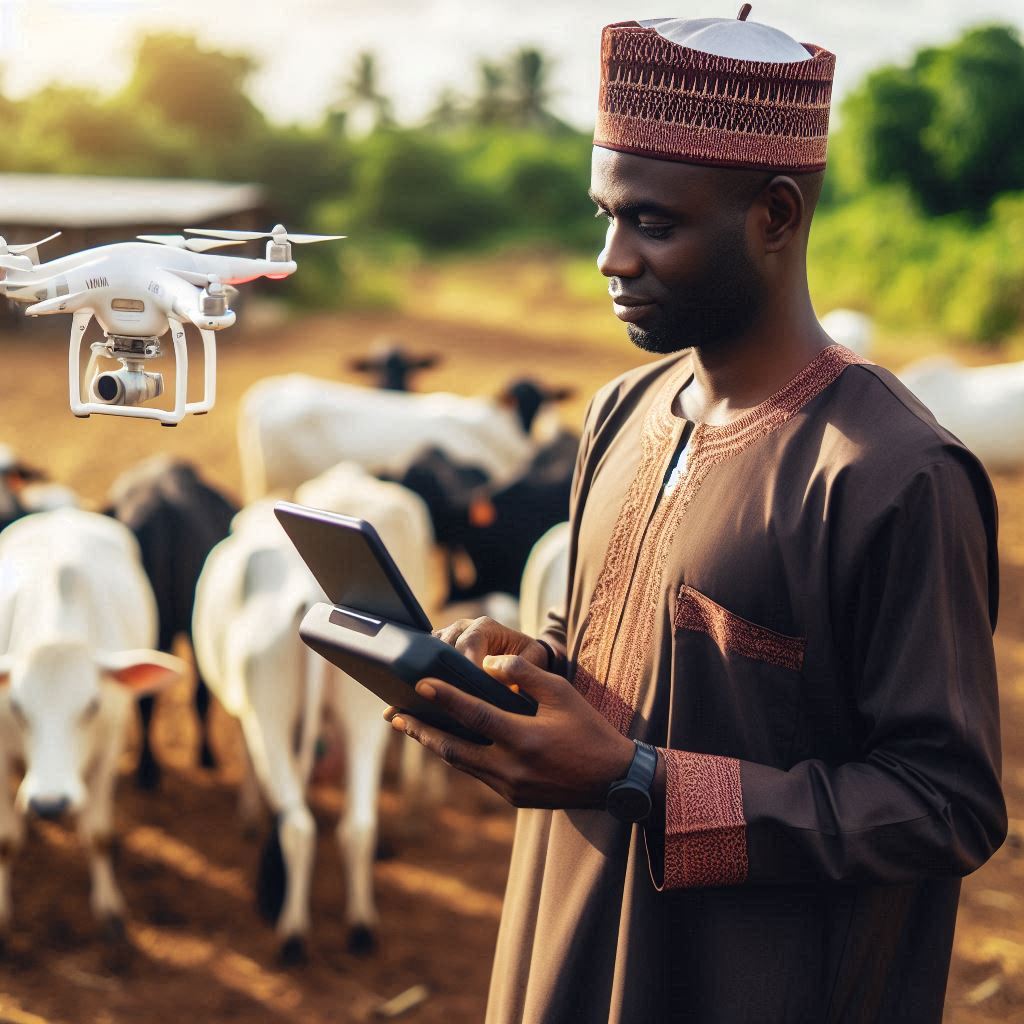Introduction
Smart farming revolutionizes livestock management in Nigeria. It involves using technology to optimize farm operations and improve productivity. This approach includes precision farming tools, data analytics, and automated systems.
What is Smart Farming?
Smart farming integrates advanced technologies into agricultural practices. It uses sensors, GPS, and data analysis to enhance decision-making. In livestock, smart farming monitors animal health, optimizes feeding, and improves breeding.
Importance for Nigeria’s Livestock Industry
Smart farming is crucial for developing Nigeria’s livestock industry.
It increases efficiency, reduces costs, and boosts production. With smart farming, farmers can monitor animal health in real-time.
Early detection of diseases leads to timely treatments, reducing losses.
Automated feeding systems ensure optimal nutrition, enhancing growth and productivity. Data-driven breeding programs improve genetic quality and livestock performance.
In fact, adopting smart farming in Nigerian livestock is essential. It drives growth, efficiency, and sustainability in the industry.
Challenges facing livestock farming in Nigeria
Livestock farming in Nigeria faces several significant challenges that impede the adoption of modern and smart farming practices. The primary issues include:
Limited Access to Modern Technology
- Infrastructure Deficiency: Many rural areas, where livestock farming is prevalent, lack the necessary infrastructure to support modern technologies. This includes reliable electricity, internet connectivity, and access to advanced farming equipment.
- High Costs: The cost of acquiring modern technology for livestock farming is often prohibitively high for many farmers. This includes expenses for advanced machinery, smart sensors, automated feeding systems, and veterinary technologies.
- Supply Chain Issues: There is often a lack of local suppliers for modern farming equipment, making it difficult and expensive to import and maintain such technologies.
Lack of Funding for Implementing Smart Farming Practices
- Limited Financial Resources: Many farmers do not have the financial means to invest in smart farming practices. Access to credit and loans is often limited, and interest rates can be high.
- Inadequate Government Support: Government funding and subsidies for livestock farming are often insufficient or poorly managed, leading to a lack of investment in modernizing the sector.
- Risk Aversion: Given the high risks associated with farming, many financial institutions are reluctant to lend to livestock farmers, particularly for new and unproven smart farming technologies.
Inadequate Knowledge and Training on Smart Farming Techniques
- Education and Training Gaps: There is a significant gap in education and training on modern livestock farming practices. Many farmers lack the necessary knowledge and skills to implement smart farming techniques effectively.
- Extension Services: Agricultural extension services, which are meant to disseminate knowledge and train farmers, are often underfunded and poorly staffed. This limits their ability to reach a large number of farmers and provide ongoing support.
- Awareness Issues: Many farmers are not even aware of the potential benefits of smart farming practices due to a lack of information and exposure to these technologies.
By addressing these challenges through coordinated efforts, Nigeria can improve the efficiency and productivity of its livestock farming sector, ensuring better livelihoods for farmers and contributing to food security in the country.
Read: Hydroponics in Nigerian Horticulture
Benefits of adopting smart farming in Nigerian livestock
Increased productivity and efficiency
- Smart farming technologies such as sensors and drones can help farmers monitor their livestock more effectively.
- Data collected from these technologies can be analyzed to optimize feeding schedules and overall animal health.
- Efficient use of resources such as water and feed can lead to higher productivity and profitability for farmers.
- Automation of tasks like feeding and monitoring can save time and labor for farmers, allowing them to focus on other aspects of their operations.
Improved animal welfare and health
- Smart farming practices can help farmers track individual animal health parameters and address issues promptly.
- Early detection of diseases and illnesses can prevent the spread of infections within the livestock population.
- Monitoring of environmental conditions such as temperature and humidity can ensure a comfortable and stress-free environment for the animals.
- Access to real-time data on animal behavior and health can lead to better decision-making and improved overall well-being of the livestock.
Sustainable practices for long-term environmental preservation
- Smart farming techniques promote the use of renewable energy sources such as solar power to reduce carbon footprint.
- Efficient waste management systems can help minimize environmental pollution and reduce the impact of livestock farming on the ecosystem.
- Water conservation practices such as drip irrigation and rainwater harvesting can help farmers reduce water usage and preserve natural resources.
- Implementation of precision farming methods can optimize fertilizer and pesticide use, minimizing waste and preserving soil health for future generations.
Read: Overview of Horticulture in Nigeria
How farmers can start implementing smart farming practices
To start implementing smart farming practices, farmers can take several proactive steps:
Investing in Smart Technologies
- GPS Tracking: Farmers can use GPS technology for precision farming. GPS tracking helps in mapping farm fields, monitoring livestock, and optimizing resource usage. This technology can enhance crop yield by ensuring efficient use of fertilizers and water.
- Sensors: Deploying sensors in fields and livestock areas can provide real-time data on soil moisture, temperature, humidity, and animal health. This data helps in making informed decisions, improving productivity, and reducing waste.
- Automation Systems: Automation can streamline various farming processes. Automated feeding systems, milking machines, and irrigation systems reduce manual labor and ensure consistent and optimal operations.
Educating Themselves on Modern Farming Techniques
- Workshops and Training Programs: Agricultural universities, extension services, and industry groups organize workshops, seminars, and training programs, providing hands-on experience and knowledge about the latest smart farming practices.
- Online Courses and Webinars: Many institutions offer online courses and webinars on smart farming. These resources can be accessed from anywhere and provide valuable information on modern techniques and technologies.
- Reading and Research: Keeping up-to-date with the latest research and developments in agriculture through journals, books, and online resources can help farmers stay informed about new innovations and best practices.
Collaborating with Government Agencies and Organizations
- Government Programs: Many governments offer programs and subsidies to support the adoption of smart farming practices. Farmers can take advantage of these initiatives for financial aid, training, and resources.
- Agricultural Extension Services: These services provide expert advice, technical assistance, and training to farmers. Extension agents can help farmers implement new technologies and practices effectively.
- Partnerships with NGOs and Private Sector: Collaborate with NGOs and private companies that focus on agricultural development for additional support. These organizations often provide resources and expertise. They assist farmers in adopting smart farming techniques.
By systematically investing in smart technologies, educating themselves, and collaborating with supportive organizations, farmers can effectively transition to smart farming practices, leading to increased efficiency, productivity, and sustainability in their farming operations.
Read: Traditional vs Modern Horticulture in Nigeria

Successful Smart Farming Practices in Nigerian Livestock
Smart farming techniques have gained traction in the Nigerian livestock industry, with several farms leading the way in implementing innovative practices. Here are some case studies of successful smart farming practices:
Examples of farms that have adopted smart farming techniques
Precision Livestock Farming
- Utilizes sensors to monitor animal health and behavior in real time
- Automates feeding schedules based on individual animal needs
- Improves overall herd management efficiency and reduces costs
Automated Herd Monitoring
- Installs GPS trackers on livestock for accurate location tracking
- Utilizes drones for aerial surveillance of grazing patterns
- Enhances security measures and quickly identifies any potential threats
Data-Driven Breeding Programs
- Utilizes genetic data analysis to optimize breeding selections
- Tracks and records pedigree information for breeding purposes
- Increases the quality and productivity of the livestock offspring
The positive outcomes and impacts on the overall livestock industry in Nigeria
These farms have seen significant positive outcomes and impacts on the overall livestock industry in Nigeria as a result of adopting smart farming techniques:
Increased Efficiency and Productivity
- Reduction in manual labor requirements and operational costs
- Improved herd health and higher quality livestock products
- Enhanced breeding programs leading to superior genetics
Enhanced Data-Driven Decision Making
- Access to real-time data for better management decisions
- Ability to predict and prevent disease outbreaks and health issues
- Optimized breeding strategies for desired traits and characteristics
Sustainable Practices and Environmental Benefits
- Reduction in resource wastage and environmental impact
- Promotion of eco-friendly farming methods and conservation of natural resources
- Contribution to the overall sustainability of the livestock industry
In summary, the implementation of smart farming practices in Nigerian livestock has proven to be a game-changer, revolutionizing traditional methods and paving the way for a more efficient and sustainable industry.
By showcasing the success stories of pioneering farms, the adoption of smart farming is set to continue growing and shaping the future of livestock farming in Nigeria.
Read: Field Work & Practical Training in Nigerian Forestry Schools
Conclusion
In closing, adopting smart farming practices in Nigerian livestock is crucial for enhancing productivity, ensuring food security, and promoting sustainable agricultural development.
By integrating modern technologies, such as IoT devices, data analytics, and automated systems, farmers can significantly improve the efficiency and management of their livestock operations.
These advancements not only help in optimizing resource use but also in monitoring animal health, improving breeding practices, and reducing environmental impact.
Farmers are encouraged to embrace these modern technologies and sustainable practices to future-proof their farms against the challenges of climate change, fluctuating market demands, and limited resources.
By doing so, they can achieve higher yields, reduce costs, and contribute to a more sustainable agricultural sector.
For further reading on smart farming techniques, explore the FAO’s comprehensive guides and case studies. The Agriculture and Rural Development sector of the World Bank also offers resources and support for technological adoption in agriculture.




